US Tipping Culture Statistics Key Takeaways:
- 9 in 10 Americans believe the tipping culture has gotten out of control.
- 3 in 5 Americans think businesses are replacing employee wages with customer tips.
- 83% of people think automatic service charges should be banned.
The practice of tipping in the United States has long been a standard part of the service industry. However, recent years have seen growing debate and scrutiny surrounding this custom.
Statistics on tipping culture in the USA reveal shifting attitudes — especially in 2025, as more Americans question the fairness, transparency, and long-term sustainability of the current tipping model.
Tipping Fatigue in the US: Is America’s Tipping Culture Out of Control?
The sentiment that tipping culture has spiraled "out of control," expressed by nearly nine in 10 Americans, isn't just about disliking the extra expense; it's a symptom of a deeper issue.
This perception reflects a growing sense that the tipping system is no longer effectively serving its intended purpose, evolving instead into something burdensome and even exploitative.
Several factors contribute to this overwhelming sentiment. One key element is the proliferation of tipping prompts. While tipping was traditionally reserved for specific service-oriented scenarios like dining and hair styling, it's now ubiquitous.
Customers are confronted with tip requests at self-checkout kiosks, for take-out orders where service is minimal and even for tasks that were previously considered part of the base price.
This constant barrage of requests generates a sense of "tip fatigue," where the act of tipping becomes less about genuine appreciation and more about navigating a social obligation.
This sentiment can cause customers to feel resentful and used, ultimately harming the business and negatively affecting the experience of dining out or purchasing any services.
Are Tips Replacing Salaries?
One of the most concerning statistics highlights the belief held by nearly three in five Americans that businesses are increasingly relying on customer tips to subsidize or even replace employee salaries.
This perception directly challenges the ethical foundations of tipping and exposes a potentially exploitative labor practice.
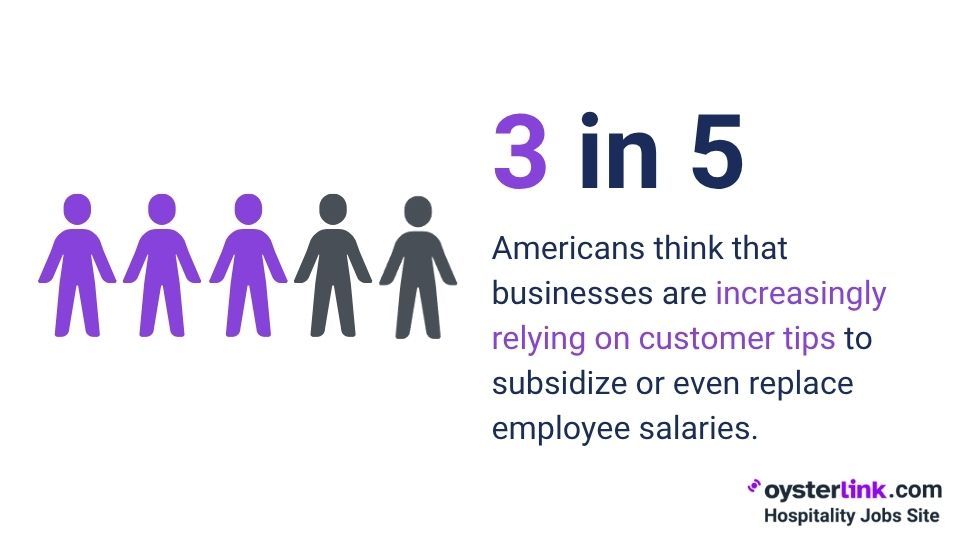
When businesses offload the responsibility of ensuring a living wage onto customers, they create an unstable situation for their employees.
Reliance on tips results in unpredictable income streams, dependent on factors like customer generosity, seasonality and even biases.
This can lead to significant financial instability for service workers, making it difficult to plan for the future or meet basic needs.
Such a system also allows businesses to maintain lower base prices while shifting the burden of compensation onto the consumer, potentially attracting customers under false pretenses.
Automatic Service Charges vs. Tips: What U.S. Consumers Think in 2025
Automatic service charges, often applied to larger groups or special events, are another major source of customer frustration.
The statistic that 83% of people believe these charges should be banned underscores the widespread opposition to this practice.
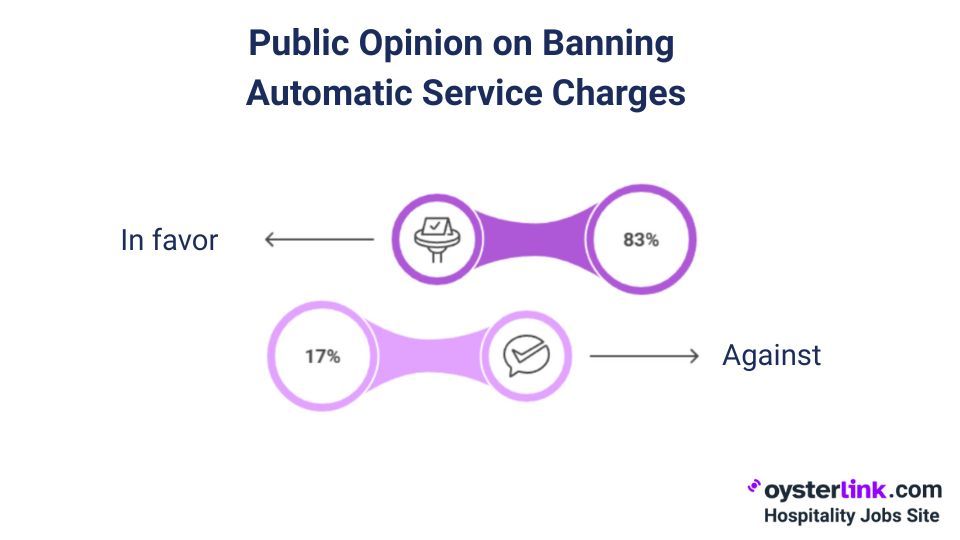
This strong disapproval stems from a combination of a lack of transparency, a perceived lack of control and a general sense of being taken advantage of.
While these charges can guarantee a minimum level of compensation, they undermine the spirit of rewarding exceptional service.
How Are Tips Taxed in the US?
More than one in four Americans believe that tips should be taxed, aligning with the current practice of taxing tips as income.
This indicates that a significant portion of the public supports the existing system, viewing it as fair and appropriate.
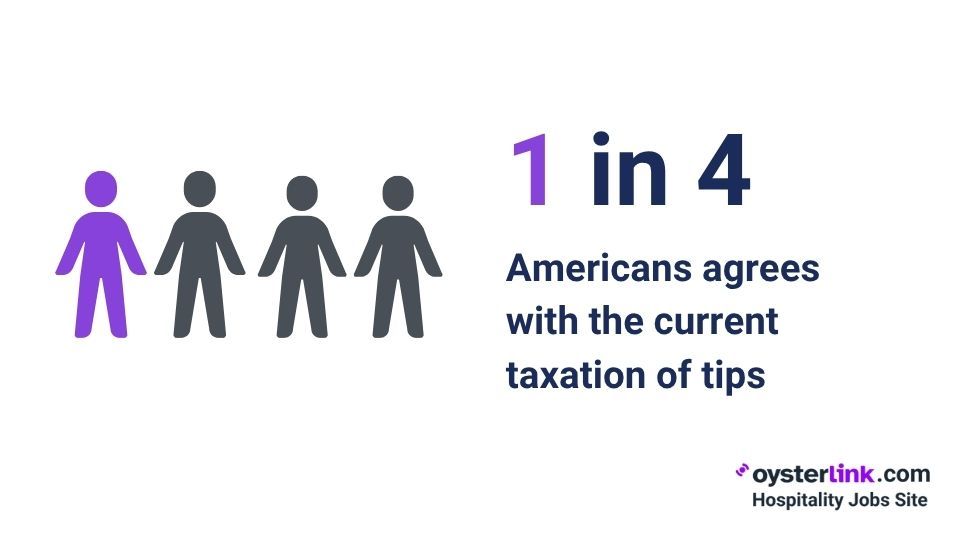
This support could arise from a perception that taxing tips helps promote fairness in the tax system, ensuring that all forms of income are treated equally.
It may also reflect an understanding that tips are considered income by the Internal Revenue Service (IRS) and are subject to taxation.
This underscores the importance of transparency and consistent enforcement to maintain public trust in tax policies.
Tip Suggestion Screens: Impact on US Tipping Habits
Tip suggestion screens are now widespread on payment terminals. They have undeniably influenced tipping behavior, but not always positively.
Nearly three in 10 Americans admit to tipping less when presented with these screens, suggesting that their intended effect may backfire.
While designed to guide and possibly increase tips, these screens can trigger resentment. This is especially true when suggested amounts seem excessive or the service was underwhelming.
See also: Pros and Cons of Digital Tipping in the Hospitality Industry
Employee Rating Systems vs. Tipping in the US
Growing dissatisfaction with the traditional tipping model has prompted the exploration of alternative compensation approaches.
In fact, 40% of Americans believe tipping should be replaced by an instant employee rating system so businesses can decide how much to pay their staff.
This indicates a desire for a more objective, performance-based approach to pay for restaurant workers.
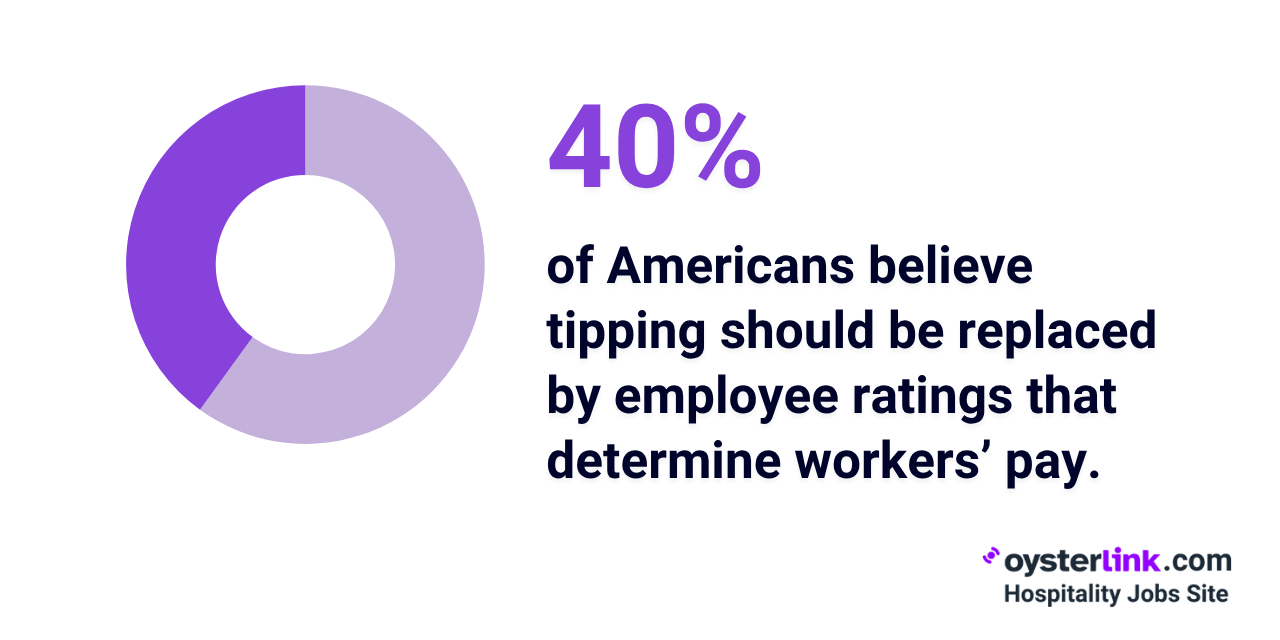
Such a model would effectively transform tipping from a customer-driven gratuity to a manager-driven bonus, potentially tied to quantifiable metrics like customer satisfaction scores, sales figures or task completion rates.
A system like this aims to incentivize excellent service and reward high-performing employees, while also providing a more predictable and stable income stream.
Where Is Tipping Still Expected in the US?
Despite the growing backlash against the broader U.S. tipping culture, over half of adults still consider a tip to be necessary or expected for certain experiences.
Dining in at independent restaurants consistently ranks highest among these tested services, highlighting the deeply ingrained nature of tipping in specific contexts.
This strong expectation can place considerable pressure on customers, and those who can’t afford the full cost of dining may choose not to eat out at all.
Future of Tipping in the US
Given the growing dissatisfaction with the current tipping system, what might the future hold? Several potential models and shifts are being discussed and tested:
- Service-inclusive pricing: Restaurants could include service charges in menu prices, offering transparency and ensuring fair wages. Challenges include consumer acceptance and potentially higher prices.
- Revenue sharing: Some businesses might allocate a portion of sales to employees, tying their pay to overall success.
- Skill-based pay: Employee ratings based on performance and customer satisfaction could determine pay, incentivizing quality but possibly introducing bias.
- Increased transparency: Clear communication about how service charges are used and employee pay promotes trust regardless of the model.
The future of tipping is likely to involve a combination of these models, tailored to specific industries and customer preferences.
As businesses adapt to changing consumer attitudes and explore alternative compensation strategies, the next few years will be crucial in shaping the evolution of tipping culture in the U.S.
How We Collected US Tipping Statistics (2025)
This article is based on recent surveys and research on the American tipping culture. Key sources include the WalletHub Tipping Survey and studies by Morning Consult on tipping behaviors.
These surveys provide valuable insights into consumer attitudes, tipping habits and preferences regarding service industry compensation.
The data from these sources have been combined to give a clear and comprehensive overview of the current tipping landscape.
About OysterLink
OysterLink is a dedicated platform designed to connect restaurant professionals with employers. It facilitates the quick and efficient placement of qualified candidates and access to quality job opportunities.
For job seekers, we provide salary insights, career guidance and top-ranked listings. For employers, we offer tools to create compelling job advertisements, identify suitable candidates and access essential business resources.
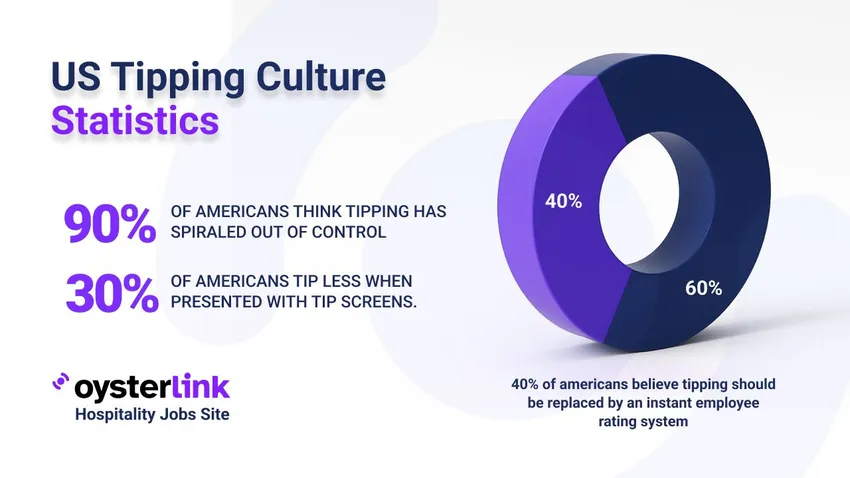







Loading comments...